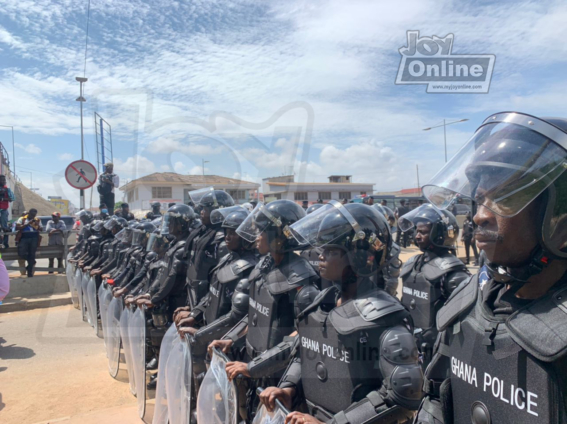Inside his office in the Upper Regional capital of Bolgatanga, journalist and media manager William Jalula expresses deep frustration about the paucity of information from the police.
“This has the potential of giving room to speculations and misinformation,” he said.
Wherever you are in Ghana, if you need information from the police, there’s the likelihood that you won’t get it. This is because across the country, police commands and spokespersons have been asked to shut up!
Koforidua-based journalist Obeng Darko Ampem, who works with Myn FM, shared a story of how the police were unwilling to speak to him about a breaking news story in a nearby community.“Recently, there was a criminal case in one of our neighbouring towns, Okrase. And my outfit tried to authenticate [information we had received] and get facts from our regional commander. Sadly enough, we were asked to contact [the police] headquarters,” he said.
The local police had information about the incident but could not release to journalists until it is passed through the editorial filter of the headquarters.
Police communication from every corner of the country has been centralised in Accra, a situation that makes it difficult for journalists and the public to get information.
There’s worry that the situation may give rise to undue speculation about happenings in the country in an age where misinformation and disinformation are a perfected art.
And many journalists across Ghana share in this frustration triggered by the stifling and centralisation of information by the police.
But how can one central communication centre handle requests from 16 regions and 216 districts? Why would the police shut its men in the regions up, the people who have firsthand information, and rather rely on communication officers at the national headquarters who only have secondary data?
Attempts by JoyNews to reach the police public affairs directorate in Accra for comment proved futile, reinforcing the worries of journalists in the various districts and regions of the country.
During the recent outbreak of violence in the Upper Region town of Bawku, journalists struggled to get information, a situation that led to widespread speculation about what was going on.
Journalist Albert Sore said: “Different information started going round. And the police PRO kept saying that he did not have information for me. If we needed information at the time that he didn’t have it, then he was suggesting that we need to talk to the public affairs directorate in Accra.”
“It’s a bit ridiculous because I cannot be here in Bolgatanga in the Upper East, and when something is happening, I need to go to Accra [which is] nearly 900km away in order to be able to get information to bring to the general public,” he said.
The Ghana Journalists Association (GJA) President Albert Kwabena Dwumfour is worried about the development. In September 2022, Mr. Dwumfour demanded in a press statement that the police practice of deliberately keeping information from the media must stop.
“Starving the media of information in a centralised system using centralisation tactics is impeding the work of the media as far as information flow is concerned,” he wrote.
“It is important to emphasize that the GJA’s quest to get this system reversed follows incessant calls from the rank and file of the media fraternity asking for action and intervention by the National Executive. It is also instructive to note that before this press statement, some of our regional branches were left with no option but to issue a statement calling on the IGP to reconsider his decision to centralise information sharing and allow regional commanders and their public relations officers to give information on issues in their jurisdiction to the media as it used to be the norm,” he indicated.
Perhaps the police can take a leaf out of the books of their counterparts in some of the most advanced democracies where local police and sheriffs in counties constantly update the public on developments.
A police media blackout in the regions and districts of the country is counter-democracy. It’s time the IGP took another look at its directive, that’s increasing robbing the public of critical information.
Latest Stories
-
Western Region police arrest 44 suspects in major ‘galamsey’ raid
49 seconds -
NADMO to launch nationwide building assessment following Cape Coast disaster
14 minutes -
Over 5,700 residents displaced by flooding in Central Region as NADMO responds to crisis
23 minutes -
8 arrested over Nkwanta clashes
2 hours -
Dr. Bryan Acheampong demands national AI strategy to drive economic growth
2 hours -
Ghana prepares for deportation of 188 nationals amid U.S. immigration crackdown
2 hours -
Corruption has no place in Ghana’s future – Nana Oye
3 hours -
Don’t forget your roots: Nana Oye interacts with Ghanaian diaspora in Austria
3 hours -
Migrating to Europe changes gut bacteria and raises heart disease risk – study finds
4 hours -
KTU Radio to participate in Bank of Ghana training workshop
5 hours -
Akwaboah to release new single ‘Smile Again’ featuring Nadia Buari
6 hours -
Actress Matilda Asare graduates from KNUST with Master’s degree
6 hours -
Nana Oye Bampoe Addo celebrates Ghanaian diaspora and cultural heritage in Vienna
7 hours -
Ghana reaffirms global leadership in anti-corruption at UN Summit in Vienna
7 hours -
Practicing quality mental health on construction sites
7 hours

